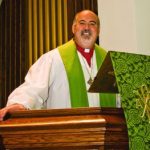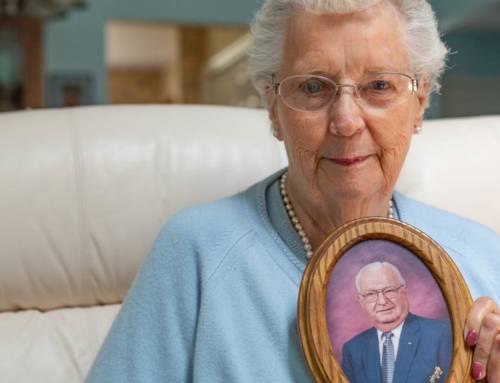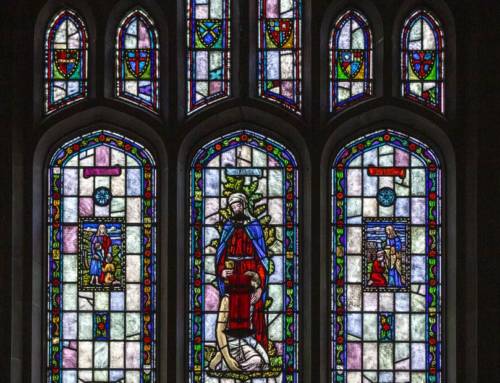
About the Author: Sunday Sermons from Sell Chapel are written by Rev. Preston Van Deursen, Director of Pastoral Care at the Masonic Village at Elizabethtown.
Don’t tell me God doesn’t speak to us in different ways.
But let me start as I usually do by trying to put a smile on our face. When I was young I really followed baseball and as a youngster from Philadelphia I loved the Phillies but if you remember in the 60’s they were almost as bad as they are now. And so everyone in Central Pa was pulling for that other team that was good the Baltimore Orioles.
You remember Frank and Brooks and Boog and, the four 20 game winners I can probably go through the whole team and tell you who played where even today.
And to top it all off was the Little general, Earl Weaver.
One of the players at that time was an outfielder named Pat Kelley who just happened to be a born again Christian.
One day Pat said to Earl Weaver, “Aren’t you glad I walk with the Lord, Earl?” Weaver replied, “I’d rather you walked with the bases loaded.”
Or When one football coach was asked about his offensive team’s execution he replied, “I’m all for it.”
I start here because I have always considered myself a sports enthusiast and sports are popular because they are a metaphor for our life experience. You win some, you lose some. Sometimes you feel like the champion of the world. Sometimes you just feel beaten up. “I’m sometimes up and I’m sometimes down,” says the old spiritual, “sometimes I’m almost to the ground.” And we’ve been there. And so have the people who are on the pages of our Bible today.
One was a righteous Jew named Jairus. His daughter was sick. In fact, she was at the point of death. “Please,” he begged Jesus, “come and place your hands on her and make her well.” Any of you who have ever had a child who was gravely ill can identify with Jairus, can’t you? I can’t imagine any pain greater than that pain. Jairus was the leader of the local synagogue. He was likely a proud man. But here he was on his knees in the dust begging an itinerant teacher to come heal his daughter. We don’t know whether Jairus thought Jesus was the Messiah or not. It is more likely, he was so desperate to help his daughter that he was willing to try anything. Unfortunately, I know some of you have been there.
The other heartsick person in our story is a woman who had been ill for twelve years with an issue of blood. She had tried countless doctors–but rather than getting better, she was now worse. Chances are, in light of the primitive nature of health care in that day and time, this lady was running out of options as well. Her condition was probably not only uncomfortable, but potentially fatal.
Two people come to Jesus who have nowhere else to turn. It is a story that is repeated everyday in healthcare facilities, hospitals, as well as private homes all over this world. It is one I have watched this past week in the waiting room for myself but also for an young Amish man who fell off a roof, a young husband who is paralyzed after hitting his head on a sandbar. The prognosis is grim . . . You better call in the family . . . There’s nothing else we can do. So we find a corner where we can be alone. And we clinch our hands and silently we mutter a prayer, “Please Jesus. Heal her.” “Please Jesus, spare him this time.” “Please Jesus, she’s such a good person. Why does she need to suffer this much?” “Please Jesus. Our family needs him.” “Please, Lord, I don’t want to die.” You and I have approached Jesus on our knees like Jairus. We’ve reached out to touch the hem of his garment like the woman with the issue of blood.
Now the clear lesson of these two stories is that Christ has the power to heal. Instantly when the woman touched the hem of Jesus’ garment the hemorrhaging stopped. Jesus didn’t have to do a thing. His presence alone made a difference for this poor woman. Jairus’ situation was a little different. Even before Jesus reached Jairus’ home, messengers arrived to tell him that it was too late. The little girl was dead and there was no point in his continuing his journey. But Jesus went anyway. She’s only sleeping, he explained. Jairus’ family and friends ridiculed him. They knew dead when they saw dead, and this little girl was dead. But Jesus told them all to leave, and taking the little girl’s father and mother and his three disciples, he went into the room where she was lying. Taking her by the hand he said to her, “Get up, little girl!” And she jumped up and walked around! And her parents were dumbfounded by what had happened.
Jesus has the power to heal. We know that. We’ve seen instances in which the doctors have said, “There’s no hope.” But they were wrong. Wherever Christ is, there is hope. Jesus has the power to heal. That brings us great comfort. But it also raises a vexing question: Why doesn’t Christ heal everyone? If he has the power, why doesn’t he exercise that power every time we call upon him? And furthermore, why do bad things happen to good people in the first place? Why does a leader of a synagogue have to watch his beloved daughter approach death’s door? Why does a woman of faith carry around a condition within her body that diminishes the quality of her life and threatens to shorten it besides? Why should good people be afflicted with coronaries and cancers, miscarriages and mastectomies?
On February 15, 1947 Glenn Chambers boarded a plane bound for Quito, Ecuador to begin his ministry in missionary broadcasting. But he never arrived. In a horrible moment, the plane carrying Chambers crashed into a mountain peak and spiraled downward. Later it was learned that before leaving the Miami airport, Chambers wanted to write his mother a letter. All he could find for stationery was a page of advertising on which was printed the single word “Why?” Around that word he hastily scribbled a final note.
After Chambers’ mother learned of her son’s death, his letter arrived. She opened the envelope, took out the paper, and unfolded it. Staring her in the face was the question, “Why?” How often have we asked that question: Why? Why God, why? And that is the difficult question as I sat in intensive care this past week I thought a lot about it and I would like to address this day. Why?
Well first There are some spiritual principles we need to affirm.
The first is that life happens. It happens. That doesn’t sound like a very spiritual principle, but you can put your money on it. Life happens. We want a “why” to everything. Why me? Why her? Why now? oftentimes there is no answer to that question. Life happens. Jesus says in Matthew 5:45 that God causes his sun to rise on the evil and the good, and sends rain on the just and the unjust. In other words, God doesn’t play favorites. I don’t care if you are the leader of a synagogue or a pastor or an Amish man or a drunk in the gutter. Life happens. If you and I are in the wrong place at the wrong time, life can knock us down before we know what is happening.
Tim Hansel tells about a special friend of his who suffers from severe cerebral palsy. She telephoned Tim one day and asked, “What does it mean for a horse to be handicapped!?” Tim answered, “Well, Leigh, they usually handicap the strongest horse by adding a little extra weight to make the race more fair.”
“Yeah, I know!” said Leigh. “Then what does it mean if you handicap a golfer?”
Tim said, “The better the golfer, the larger the handicap.” “Yeah, I know!” Leigh said again. “And what does it mean . . .” They explored a number of sports with the same conclusion. There was a long pause. Finally Leigh said, “That’s it!” “That’s what, Leigh?” Tim asked.
“That’s it!” Leigh said, “That’s why God gave me such a big handicap . . . because I’m so special!” Well, I have no doubt Leigh is a special person, but I don’t believe for one bit that is is how God works. It would be difficult for me to believe that God chooses people to suffer from problems like cerebral palsy. To a great extent life is a matter of chance. A certain number of people will be stricken with cerebral palsy. Leigh just happened to be among the unlucky.
Life happens. Think about it. It makes sense. If God wrapped an invisible protective shield around everyone who believed in Him, then of course everyone would believe–not out of love, but out of a calculated self-interest. “I’m going to become a Christian,” we would say, “so that God will take care of me and my family.” Becoming a Christian would be the same as signing up with an HMO–except we would have a perfect physician. But then we would also have no freedom to believe or disbelieve. We would be enslaved because of our fear of pain and death. And that is clearly not what God had in mind. Life happens. When it comes to many of life’s vicissitudes, you and I are vulnerable to heartaches and tragedies just as everyone on earth is vulnerable.
That brings us to a second principle: Christian faith has little to do with what happens to us; but it has everything to do with how we handle what happens to us. People of faith handle adversity differently from people
who have no faith.
For Faith is itself a resource. We have resources that people without faith do not have. I have had all of you praying for us and people all over. Notice how often in the New Testament Jesus said, as he did with the woman with the issue of blood, “Your faith has made you well.” There is power in belief. Scientific research proves that believers are happier and healthier than non-believers. Not because God plays favorites. Not because He blesses some people and withholds His blessings from others. But we were made for faith–not for fear. And there is healing power in belief.
Doctors talk about the placebo effect–how some people respond to medicine, not because the medicine has any value, but because the patients believe in the medicine. In one study in which some of the patients received placebos, the results were quite striking. This was a study of a new treatment for stomach cancer. Here’s what is interesting: one-third of the patients who received placebos developed nausea, one-fifth developed vomiting, and almost one-third lost their hair. The placebo was just a sugar pill. It could not have hurt or helped anybody. But because the people in the study thought it would affect them, it did. Belief is powerful. What you believe can kill you–or heal you.
We have faith, and we have prayer. We know that God is not going to physically heal everyone we pray for. But, again, scientific studies confirm what many of us know from personal experience: people respond to prayer. There is healing in prayer–sometimes for the body, always for the soul.
Dr. Randy Byrd was a staff cardiologist at the San Francisco General Hospital and a professor at the University of California. He conducted a ten-month study of 393 patients admitted to the coronary care unit at the hospital over those months. One hundred ninety-two of those patients were assigned to a prayer group. The remaining 201 were not. Neither the patients, nurses, nor attending physicians knew which group the patients were in. Dr. Byrd recruited Roman Catholic, Protestant, and Jewish groups around the country to pray for the designated 192 patients. They were given the patients’ names, something of their condition, and were asked to pray for these persons by name once each day. No other instructions were given. The results were startling. The prayed-for patients were five times less likely to require antibiotics, and three times less likely to develop fluid filling the lungs. None of these prayed-for patients required breathing tubes compared to 12 in the other group. And fewer of the prayed-for patients died. Prayer works. We don’t always get what we ask for when we pray, but God is responsive to our prayers. We have resources the world does not have. We have faith. We have prayer, and we have the community of the saints.
We draw strength from bearing one another’s burdens. I can testify to that as so many people in this church can testify how much it helped in a time of crisis to have the love and support of the people in this church.
Life happens. Faith has little to do with what happens to us; faith has everything to do with how we handle what happens to us. But there is one more principle we acknowledge: Ultimately, God is in control. You and I have a decision that we need to make about life. The decision may be expressed this way: Just how much do we trust God? Can we trust Him when one of our children lies at death’s door? Can we trust Him when we have a crisis with our own health or our spouses? Anyone can trust God when things are going our way, but what about those moments when even the universe seems aligned against us?
I don’t pretend to know the mind of God. I am a searcher, just as you are a searcher and boy have I been doing a lot of searching But I do know this. In my seasons of highs and lows, I’ve noticed some things in particular. WE rarely learn anything from pleasure, but we learn volumes from pain. Don’t get me wrong. I prefer pleasure. Only a fool would prefer pain. But I’ve noticed that, whereas the highs make us glow, the lows make us grow. And I have to believe this is why God put us in a world of both pleasure and pain, good and evil, highs and lows. The highs keep us going, but the lows keep us growing–emotionally, intellectually and spiritually until that day comes when we are fit to live eternally in the presence of God.




